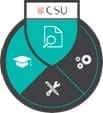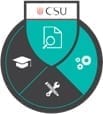Information Literacy is the ability to identify what information you need and the best sources for that information, locate those sources, understand how the information is organised, evaluate the information and its source critically, and share that information safely and ethically. It is the knowledge of commonly used research techniques in a discipline and provides a basis for lifelong learning. It is also widely defined as “people’s ability to operate effectively in an information society” (Bruce, C 1999).
Drawing on international frameworks, including university of Adelaide’s Research Skills Development framework and the Association of College & Research Libraries’ Framework for Information Literacy for Higher Education, this resource outlines strategies that will assist your students to engage with information literacy concepts and empower them to apply these skills in the workplace.
Information & Research Literacies Graduate Learning Outcome
Demonstrate capability as inquirers to locate, evaluate, manage, and use information and research to develop and guide their own knowledge, learning, and practice
| Knowledge | Skill | Application |

Demonstrate that disciplinary knowledge is developed through research and evidence |

Demonstrate the skills required to locate, access and critically evaluate existing information and data
|
 Synthesise and apply information and data to different contexts to facilitate planning, problem solving and decision making Synthesise and apply information and data to different contexts to facilitate planning, problem solving and decision making |
